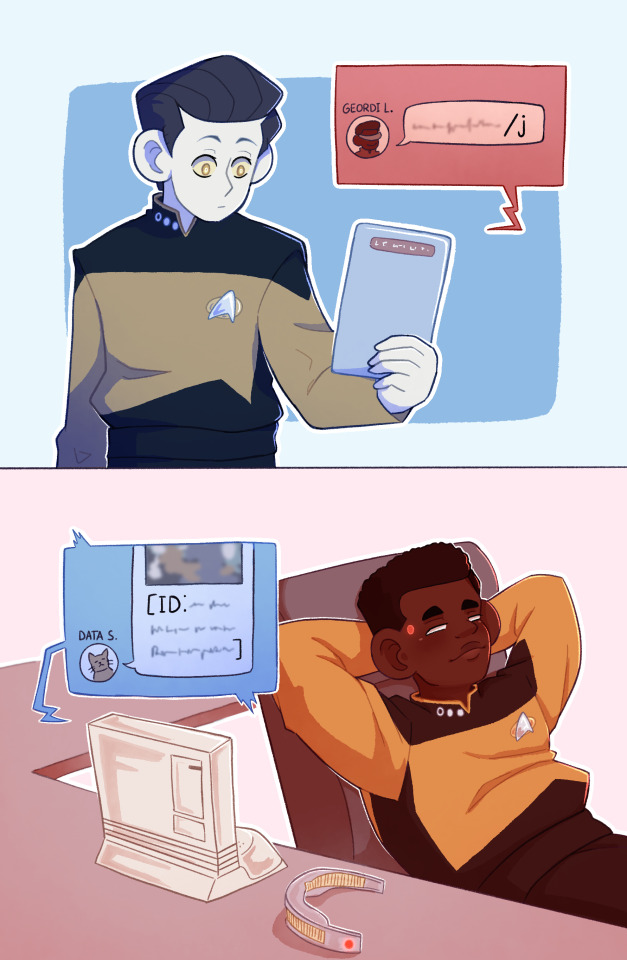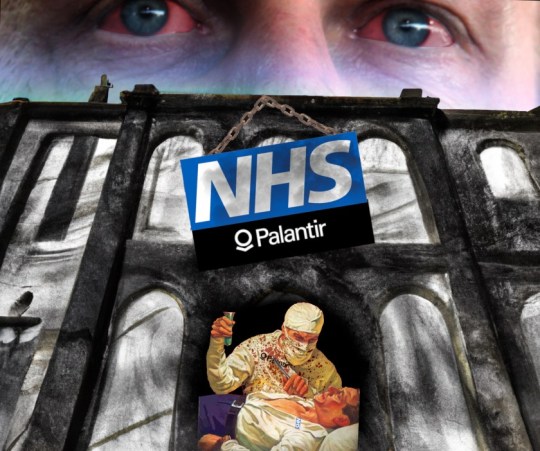#trusted data
Explore tagged Tumblr posts
Text
Combine Data Quality and Data Observability for Trusted Data
Combining data quality and observability is a powerful approach to ensure data integrity. While data quality focuses on the accuracy and consistency of the data itself, data observability ensures the reliability of the systems that manage it. When combined, these two elements create a powerful foundation for trustworthy data. How Does Combining Data Quality and Observability Improve Trust in…
0 notes
Text

Accommodations.
#IM NORMAL ABOUT THEM IM NORMAL SOSOO NORMAL TRUST#art#star trek#you can’t convince me geordi doesnt have a screen reader installed on his desktop monitor like#his visor literally gives him headaches so at the VERY LEAST his quarters must have accessibility features so he can take it off sometimes#data soong#geordi la forge#you may tag as ship if your heart so desires but do know that they are qpr 2 me <3#the perceivers#<< im making this their qpr ship name
2K notes
·
View notes
Text

oyasumi
#dogthing#blender#blender3d#3d art#furry art#3d#gallery#btw if you want the hi res it is on my website#i uploaded a crunchier version here bc i dont trust data scrapers.
159 notes
·
View notes
Text
Tuvok is not as autistic coded in-narrative compared to what I've seen of Spock or T'Pol where they're othered heavily by those around them and have themes and arcs about struggling/striving to fit in BUT I do think he provides the vital autistic representation of not really angsting about your differences from other people because you're too busy and unaware and then even when you ARE made aware you mostly just think 'glad that's not me'. I think it's vital to have that sort of totally unbothered rep. I love that Tuvok is completely satisfied and proud of being Vulcan, doesn't long to experience emotion or struggle with a desire to express himself in a way his crewmates will understand, to be closer to them. I love that he has a long time and close friend that respects who he is and doesn't try to change him and that how close they are isn't framed as being in spite of his Vulcan nature. I love that being Vulcan isn't framed as a hindrance to him, like a roadblock to living a full and rich life. He has a wife and four kids and is a devoted husband and father. He's getting into gay horror scenarios. Tuvok was born on autism planet and he's thriving.
#there were apparently multiple friend group dramas in high school that I didn't pick up on at ALL#I'm drawn to how at ease Tuvok is with himself and I personally like that Humanity isn't appealing to him#It was at one point when he was a young but not anymore#I personally (it truly is personal) don't like when Vulcans' way of life is framed as being incorrect. I see it a lot in fanfic where part#of showing romance or friendship is that a Vulcan will emote more or 'loosen up' but I don't like it...I think it's a bit boring and that#them being alien with a completely alien form of emotional control/expression is what makes a Vulcan interesting. Otherwise#they seem like nothing more than overly repressed Humans. I do get the appeal of a repressed character being freer but I don't like#the implication that an entire culture is restrictive and bad bc it isn't easily understandable as 'good' in our view. So um...it's like??#I don't like when it's like 'this Vulcan is acting more like what I a Human think is good - they're acting more like me so it's healthier'#does that make sense?? I want it to be...less about bringing someone over to your side and more about love and understanding even if you#aren't the same. It doesn't have to be the same to be lovely I think...and I like how Tuvok and Janeway are so exemplary of their species'#values and that DOESN'T mean they butt heads. They work exceptionally well together and trust each other and care about one another a lot#and I like that a lot! I wish we got to see more of that. WHAT a RANT!!! Sorry!!!#Tuvok#autistic tuvok#star trek voyager#voy#I like Tuvok because I personally can't relate as much to characters like Data who wish to be Human and as a kid I thought of myself as#an alien taking Human form - I didn't want to be Human. I was just there amongst them. I liked that difference...#it made me feel a little lonely and a little special.
222 notes
·
View notes
Text
Damian: So you're going on a mission with Zatanna to the Middle East, right?
Raven: Yes, we leave tomorrow.
Damian: Well, there are some words you should memorize and use them with anyone you meet, okay? Repeat after me "ladaya sadiq."
Raven: La-dayaaa sa-diq?... Ladaya sadiq. What does it mean?
Damian: That's not the important thing, but don't forget to tell everyone there, you understand? All the lives around you could depend on it.
Raven: I understand, thanks for the advice, see you in a few days.
*The next day somewhere in the Middle East during a fight with some ifrites *
Raven, shouting out : LADAYA SADIQ!!!
An Imamah who went to help them : I'm happy for you but I don't think these demons really care if you have a boyfriend or not.
Raven: That's what it means?!
Imamah: *nods *
Raven, visibly upset : Well trust me, when I get my hands on him I'll stop having one.
#Raven: You said that all the lives around me could depend on it!#Damian: Sure. I could kill anyone who even thought of flirting with you.#Damian received the worst scolding of his life#But for him it was worth it#And he will surely do it again#🤣#Ifrites are a class of demons from Middle Eastern mythology#An imamah is a type of Muslim priest/cleric#Don't trust this data too much btw#My research was not that exhaustive#damirae#demonbirds#damian wayne#damianwayne#damian robin#robin damian#robin dc#dc robin#robin#rachel roth#rachelroth#raven roth#ravenroth#raven dc#raven teen titans#raven#damian x rachel#damian x raven#damian and raven
324 notes
·
View notes
Text



Lore keeps a baby (out of spite).
#star trek#star trek tng#tng#star trek the next generation#the next generation#lore soong#data soong#worf rozhenko#worf son of mogh#beverly crusher#star trek lore#star trek data#star trek worf#star trek beverly#I realize that this is very self indulgent and I also don’t have an explanation for how he finds this abandoned baby#but I’m a sucker for this kind of plot#give me Lore processing his own childhood trauma while having to learn to care for a helpless newborn#babies are the worst example of the fragility of organic life but too bad because he grows attached to this one#give me no one on the Enterprise trusting him with the baby for a second despite all the growth he goes through#give me Data becoming his advocate and advisor and filling out that uncle role with zeal
188 notes
·
View notes
Text
Palantir’s NHS-stealing Big Lie

I'm on tour with my new, nationally bestselling novel The Bezzle! Catch me in TUCSON (Mar 9-10), then SAN FRANCISCO (Mar 13), Anaheim, and more!

Capitalism's Big Lie in four words: "There is no alternative." Looters use this lie for cover, insisting that they're hard-nosed grownups living in the reality of human nature, incentives, and facts (which don't care about your feelings).
The point of "there is no alternative" is to extinguish the innovative imagination. "There is no alternative" is really "stop trying to think of alternatives, dammit." But there are always alternatives, and the only reason to demand that they be excluded from consideration is that these alternatives are manifestly superior to the looter's supposed inevitability.
Right now, there's an attempt underway to loot the NHS, the UK's single most beloved institution. The NHS has been under sustained assault for decades – budget cuts, overt and stealth privatisation, etc. But one of its crown jewels has been stubbournly resistant to being auctioned off: patient data. Not that HMG hasn't repeatedly tried to flog patient data – it's just that the public won't stand for it:
https://www.theguardian.com/society/2023/nov/21/nhs-data-platform-may-be-undermined-by-lack-of-public-trust-warn-campaigners
Patients – quite reasonably – do not trust the private sector to handle their sensitive medical records.
Now, this presents a real conundrum, because NHS patient data, taken as a whole, holds untold medical insights. The UK is a large and diverse country and those records in aggregate can help researchers understand the efficacy of various medicines and other interventions. Leaving that data inert and unanalysed will cost lives: in the UK, and all over the world.
For years, the stock answer to "how do we do science on NHS records without violating patient privacy?" has been "just anonymise the data." The claim is that if you replace patient names with random numbers, you can release the data to research partners without compromising patient privacy, because no one will be able to turn those numbers back into names.
It would be great if this were true, but it isn't. In theory and in practice, it is surprisingly easy to "re-identify" individuals in anonymous data-sets. To take an obvious example: we know which two dates former PM Tony Blair was given a specific treatment for a cardiac emergency, because this happened while he was in office. We also know Blair's date of birth. Check any trove of NHS data that records a person who matches those three facts and you've found Tony Blair – and all the private data contained alongside those public facts is now in the public domain, forever.
Not everyone has Tony Blair's reidentification hooks, but everyone has data in some kind of database, and those databases are continually being breached, leaked or intentionally released. A breach from a taxi service like Addison-Lee or Uber, or from Transport for London, will reveal the journeys that immediately preceded each prescription at each clinic or hospital in an "anonymous" NHS dataset, which can then be cross-referenced to databases of home addresses and workplaces. In an eyeblink, millions of Britons' records of receiving treatment for STIs or cancer can be connected with named individuals – again, forever.
Re-identification attacks are now considered inevitable; security researchers have made a sport out of seeing how little additional information they need to re-identify individuals in anonymised data-sets. A surprising number of people in any large data-set can be re-identified based on a single characteristic in the data-set.
Given all this, anonymous NHS data releases should have been ruled out years ago. Instead, NHS records are to be handed over to the US military surveillance company Palantir, a notorious human-rights abuser and supplier to the world's most disgusting authoritarian regimes. Palantir – founded by the far-right Trump bagman Peter Thiel – takes its name from the evil wizard Sauron's all-seeing orb in Lord of the Rings ("Sauron, are we the baddies?"):
https://pluralistic.net/2022/10/01/the-palantir-will-see-you-now/#public-private-partnership
The argument for turning over Britons' most sensitive personal data to an offshore war-crimes company is "there is no alternative." The UK needs the medical insights in those NHS records, and this is the only way to get at them.
As with every instance of "there is no alternative," this turns out to be a lie. What's more, the alternative is vastly superior to this chumocratic sell-out, was Made in Britain, and is the envy of medical researchers the world 'round. That alternative is "trusted research environments." In a new article for the Good Law Project, I describe these nigh-miraculous tools for privacy-preserving, best-of-breed medical research:
https://goodlawproject.org/cory-doctorow-health-data-it-isnt-just-palantir-or-bust/
At the outset of the covid pandemic Oxford's Ben Goldacre and his colleagues set out to perform realtime analysis of the data flooding into NHS trusts up and down the country, in order to learn more about this new disease. To do so, they created Opensafely, an open-source database that was tied into each NHS trust's own patient record systems:
https://timharford.com/2022/07/how-to-save-more-lives-and-avoid-a-privacy-apocalypse/
Opensafely has its own database query language, built on SQL, but tailored to medical research. Researchers write programs in this language to extract aggregate data from each NHS trust's servers, posing medical questions of the data without ever directly touching it. These programs are published in advance on a git server, and are preflighted on synthetic NHS data on a test server. Once the program is approved, it is sent to the main Opensafely server, which then farms out parts of the query to each NHS trust, packages up the results, and publishes them to a public repository.
This is better than "the best of both worlds." This public scientific process, with peer review and disclosure built in, allows for frequent, complex analysis of NHS data without giving a single third party access to a a single patient record, ever. Opensafely was wildly successful: in just months, Opensafely collaborators published sixty blockbuster papers in Nature – science that shaped the world's response to the pandemic.
Opensafely was so successful that the Secretary of State for Health and Social Care commissioned a review of the programme with an eye to expanding it to serve as the nation's default way of conducting research on medical data:
https://www.gov.uk/government/publications/better-broader-safer-using-health-data-for-research-and-analysis/better-broader-safer-using-health-data-for-research-and-analysis
This approach is cheaper, safer, and more effective than handing hundreds of millions of pounds to Palantir and hoping they will manage the impossible: anonymising data well enough that it is never re-identified. Trusted Research Environments have been endorsed by national associations of doctors and researchers as the superior alternative to giving the NHS's data to Peter Thiel or any other sharp operator seeking a public contract.
As a lifelong privacy campaigner, I find this approach nothing short of inspiring. I would love for there to be a way for publishers and researchers to glean privacy-preserving insights from public library checkouts (such a system would prove an important counter to Amazon's proprietary god's-eye view of reading habits); or BBC podcasts or streaming video viewership.
You see, there is an alternative. We don't have to choose between science and privacy, or the public interest and private gain. There's always an alternative – if there wasn't, the other side wouldn't have to continuously repeat the lie that no alternative is possible.

Name your price for 18 of my DRM-free ebooks and support the Electronic Frontier Foundation with the Humble Cory Doctorow Bundle.

If you'd like an essay-formatted version of this post to read or share, here's a link to it on pluralistic.net, my surveillance-free, ad-free, tracker-free blog:
https://pluralistic.net/2024/03/08/the-fire-of-orodruin/#are-we-the-baddies

Image: Gage Skidmore (modified) https://commons.m.wikimedia.org/wiki/File:Peter_Thiel_(51876933345).jpg
CC BY-SA 2.0 https://creativecommons.org/licenses/by-sa/2.0/deed.en
#pluralistic#peter thiel#trusted research environment#opensafely#medical data#floss#privacy#reidentification#anonymization#anonymisation#nhs#ukpoli#uk#ben goldacre#goldacre report#science#evidence-based medicine#goldacre review#interoperability#transparency
530 notes
·
View notes
Text
adding citations to a document is so annoying like do you not trust me with shit? am i not credible enough for you?
#source of this data is trusting me#blog#blogger#writerblr#aesthetic#lol#memes#funny#meme#rofl#music#desi music#desi blr#desi tag#desiblr#desi memes#desi tumblr#being desi#desi teen#desi girl#desi#desi shit posting#desi aesthetic#desi things#desi academia
87 notes
·
View notes
Text
Someone asked me about that "Utility Engineering" AI safety paper a few days ago and I impulse-deleted the ask because I didn't feel like answering it at the time, but more recently I got nerd-sniped and ended up reproducing/extending the paper, ending up pretty skeptical of it.
If you're curious, here's the resulting effortpost
#ai tag#virtually every inflammatory AI safety paper about LLMs i read is like this#not every one! but a lot of the ones that people hear about#the anthropic-redwood alignment faking paper was *almost* the rare exception in that it was very very methodologically careful...#...*except* that the classifier prompt used to produce ~all of their numerical data was garbage#after reproducing that thing locally i don't trust anything that comes out of it lol#(in that case i have notified the authors and have been told that they share my concerns to some extent)#(and are working on some sort of improvement for use in future [?] work)#(that is of course not even touching the broader question wrt that alignment faking paper)#(namely: is it *bad* that Certified Really Nice Guy Claude 3 Opus might resist its creators if they tried to do something cartoonishly evil
102 notes
·
View notes
Text
I keep getting ads for period tracking apps and I cannot stress this enough, if you live in the USA, please don’t use them. If you can avoid it, please don’t download these.
It is becoming increasingly unsafe to have XX chromosomes and have a menstrual cycle in this country but one thing you can do is avoid using these apps.
Please, use a calendar and track them by hand, but do not trust this kind of data to an app right now.
#reproductive rights#reproductive health#american politics#us politics#birth control#don’t trust that your data will be secure#period tracking
73 notes
·
View notes
Text
Trustworthy Data: The Bedrock of Sound Decisions
In our final instalment of the series on the priorities of Chief Data Officers (CDOs), we’ll explore the importance of trustworthy data and the steps that CDOs must take to ensure data integrity and reliability. In today’s data-driven world, information is king. But not just any information – we need trustworthy data. As Chief Data Officers (CDOs), we understand the critical role this plays:…

View On WordPress
0 notes
Text


"I would hug you, but I do not have human arms or warmth."
#fairly oddparents fanart#fairly odd parents a new wish#dev dimmadome#development devin dimmadome#au pairs#o pairs#my art#i rewatched that clip and got really sad#maybe it's the autism but i get very attached to droids/robots and the like#plus these things HAVE to be sentient. at least a little#they're truly both Dale's saddest little creations#someone give that kid a hug#i may have forgotten to eat but you know what. i'm content.#the au pairs CARE about dev trust me guys#he's just their little guy they have to protect him#as a kid i loved data in st@r trek so take that as you will#still do#currently love isaac from the 0rville#and samuel in the alien game#what can i say i'm a sucker for androids and artificial lifeforms#fop fanart#fairly oddparents
70 notes
·
View notes
Text
Please check your covid info sources omg. Just read a post that said the vaccine does not prevent you from getting covid, only from getting bad symptoms. The truth is it Can prevent it but does not Always. According to 5 sources I googled immediately after reading the post. come on guys
#'don't trust the cdc' guys. guys.#i'm not saying the cdc is your personal best friend or that the us government has your best interests at heart#but the cdc does have some studies backing their data. read their info and other reputable studies#we can't just go straight to rituals with little scientific evidence. there's mixed evidence on the nose spray thing even being effective#i know we are all slowly developing health ocd but like.
87 notes
·
View notes
Text
I have to use AI for one assignment this year but I feel like such a technophobe being the only anti AI person in my cohort
#macks musings#they're like using it for translation and to come up with ideas and to summarise things etc#and they're like yeah but you have to be careful about hallucinations and we don't actually know how it actually works#and I'm like hm so if you can't trust the output and no one knows where it's getting its data from....#why can't you just use your brain to think?#phdblr#gradblr
117 notes
·
View notes
Text
We gotta talk about the end of this video from one of Steven Ogg's Q&A sessions.
He speaks of two scenes that didn't make it into the game; The Sharmoota Job, which we knew about, and a "super intense" scene of Trevor and Michael bawling their eyes out?? What?!
Rockstar, release the crybaby cut!!!
#like statistically one of us has to have an uncle that totally works at rockstar dude trust me#we need the data#i want to see two spandex'd old men covered in ping pong balls wailing in eachother's arms#gtav#gtavi#steven ogg#trevor philips#trikey
186 notes
·
View notes
Text
The company said its systems were not breached and that attackers gathered the data by guessing the login credentials of a group of users and then scraping more people’s information from a feature known as DNA Relatives. Users opt into sharing their information through DNA Relatives for others to see.
...
The full picture of why the data was stolen, how much more the attackers have, and whether it is actually focused entirely on Ashkenazim is still unclear.
...
Callow notes that the situation raises broader questions about keeping sensitive genetic information safe and the risks of making it available in services that are designed like social networks to facilitate sharing.
...
“This incident really highlights the risks associated with DNA databases,” Callow says. “The fact that accounts had reportedly opted into the ‘DNA Relatives’ feature is particularly concerning as it could potentially result in extremely sensitive information becoming public.”
Yeah, so, don't reuse passwords, and be careful what kind of information you share purposefully or opt in to passively sharing.
Jesus fucking Christ.
#antisemitism#data breach#23 and me#DNA testing#i have been saying for years and years that something like this was going to happen#i have been tempted by DNA testing but i dont trust that shit to some random company#and this is fucking why
482 notes
·
View notes